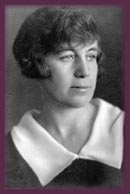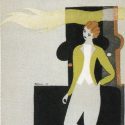Agnes von Krusenstjerna grew up in an aristocratic officer’s family and has been labelled a decadent, trivial writer, but has also been celebrated as a genius on a par with Marcel Proust and D. H. Lawrence. Due to mental illness, which took the form of bouts of hysteria, she was forced to leave school a year before her final examinations. She did not receive any further education. Except for periods spent in psychiatric hospitals, she lived in her childhood home until her marriage in 1921 to the cultural writer David Sprengel.
She made her debut in 1917 with Ninas dagbok followed by Helenas första kärlek, 1918, – both girls’ novels written in a light, conversational style. Her breakthrough work was her trilogy Tony växer upp, Tonys läroår, and Tonys sista läroar, 1922-1926, about a nobleman’s daughter, Tony Hastfehr, who succumbs to a hereditary mental illness. It is based on Agnes von Krusenstjerna’s own experience, and its realism attracted much attention. Her novel cycle Fröknarna von Pahlen I-VII, 1930-1935, which describes women’s lives and emancipation in the Swedish upper class before and during World War I, gave rise to a heavy debate about poetry and morals – the so-called Pahlen controversy – particularly volumes IV-VII, Porten vid Johannes, Älskande par, Bröllup på Ekered, and Av samma blod.
Agnes Krusenstjerna was sharply attacked by conservatives, church groups, and Nazi-sympathisers for her candid, erotic descriptions and revelations about depraved lifestyles among the upper class. Her last important work was the serial novel entitled Fattigadel I-IV, 1935-1938, which is based on her experiences in her formative years. Her writing played an important role in the advanced debate on women’s rights in the interwar period. In terms of literary history, she ranks among the vitalists, although her female characters distance themselves from the sexual romanticism of vitalism.
Further Reading
Rita Paqvalén: “Love as a feminist project: a reading of the "Pahlen" series by Agnes von Krusenstjerna” in: The new woman and the aesthetic opening: unlocking gender in twentieth-century texts, 2004
Birgitta Svanberg: “The mother-daughter-conflict in "Fattigadel" (Petty nobiblity) by Agnes von Krusenstjerna” in: Mothers - saviours - peacemakers, 1983




